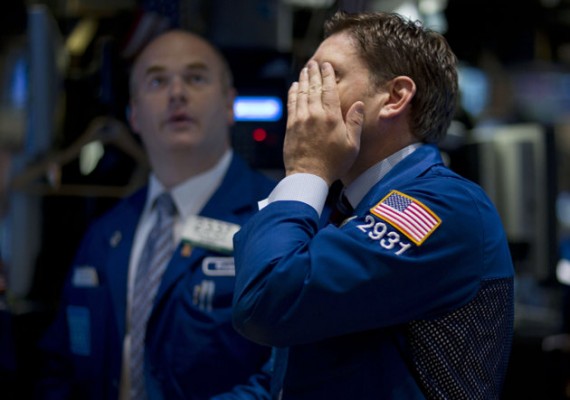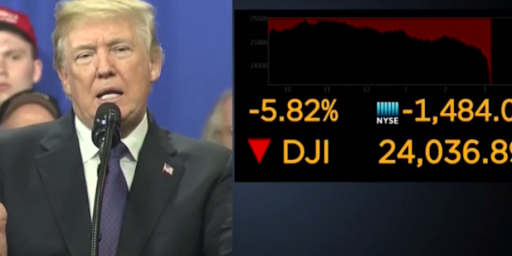Dow Plunges Over Double Dip Worries
Apparently, getting the debt deal done was not a panacea.
Apparently, getting the debt deal done was not a panacea.
AP (“Stocks plunge as economic, Europe worries continue“):
The stock market is in the midst of its biggest retreat since the financial crisis.
The Dow Jones industrial average plunged as many as 440 points in Thursday afternoon trading. It is now down more than 1,200 points since July 21. The Standard & Poor’s 500 index is down 3 percent, bringing it nearly 11 percent below its recent high of 1,363 reached on April 29.
All three major indexes are down 10 percent or more from their previous highs, a drop-off that is considered to be a market correction. A drop of 20 percent or more signifies the start of a bear market, an extended period of stock declines.
Investors are increasingly concerned about the possibility of another recession in the U.S. and a debt crisis in Europe.
Not shockingly, President Obama’s poll numbers are down with the market. The stock markets had been about the only good economic news in recent months.





I’m glad I put almost all my money into a stable value fund 7/15 over concern about the debt ceiling dragging out to the last minute.
What a shock! Wall Street has been demanding budget cuts for nearly two years. Now they’ve got it and they realize austerity (and the economic weakness that attends it) has come to America. It’s becoming clear the United States has the stupidest investors on the planet.
@Ben Wolf:
Yeah, things like the declining PCE numbers have absolutely nothing to do with it. And weren’t you channeling Dick Cheney in another thread saying the debt is economically irrelevant?
Well I am sure that if we just lay off another few thousand gov’t employees, and carve out another round of tax cuts for the 1%, things will turn around!
@Steve Verdon: When did I say in this thread that the debt was relevant. I know you’ve been trying to up your right libertarian snark factor, but this isn’t cutting it.
This is the dumbest thing you’ve written all day. What the hell do you think is going to happen with lower government expenditures? PCE will go up???
So, if the Republicans, champions of Wall Street & the Free Market, got practically everything they wanted in the debt negotiations, why is Wall Street sprinting away from them the very next day? Are Republicans really as fiscally stupid as I’ve snarked them for (not that Dems are showing themselves any better right now)? Or did they all just get played by the Invisible Hand?
I’ve been backpacking for a few days (summited Whitney, yay), and it was funny to come back down and find another crisis in bloom. It almost seemed like “if it’s not one thing, it’s another.”
As I catch up though, I think this article by Michael Schuman makes the most sense: